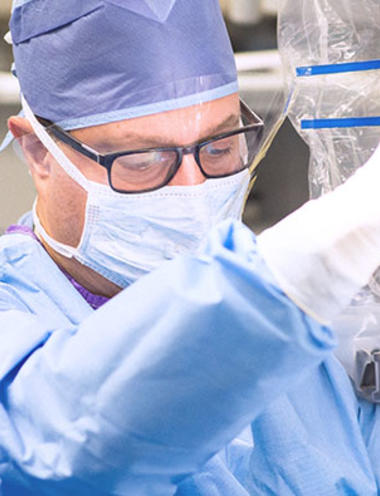Spine Care
The orthopedic physicians and spine specialists at Tempe St. Luke’s Hospital provide comprehensive diagnostic and treatment services for diseases and injuries of the neck and back.
The orthopedic physicians and spine specialists at Tempe St. Luke’s Hospital provide comprehensive diagnostic and treatment services for diseases and injuries of the neck and back.
1500 S. Mill Avenue
Tempe, AZ 85281
480-784-5667

The orthopedic physicians and spine specialists at Tempe St. Luke’s Hospital provide comprehensive diagnostic and treatment services for diseases and injuries of the neck and back. Call Tempe St. Luke’s Hospital at (480) 784-5667 for more information.
Most people associate issues of the spine with pain in the back or neck. However, conditions of the spine can cause other seemingly unrelated symptoms such as incontinence, difficulty walking, pain in the extremities and loss of dexterity. At Tempe St. Luke’s Hospital, orthopedic specialists treat many of these spine-related issues.
Cause: If you are experiencing numbness or weakness in your arms or legs, a natural conclusion might be that the problem’s source is in the arm or leg. Often, though, a spinal injury will cause numbness or weakness to the extremities. This may occur when pressure is applied to the nerves in the spinal cord. Examples of spinal injuries that could present as pain, numbness, or weakness in the arms and legs are disc herniation, bone spurs, spinal stenosis and degenerative disc disease. If a spinal nerve is pinched in the upper back or neck, you may feel tingling or lack of dexterity in your arms or hands. If the nerves of the lower back are agitated, you could feel numbness and weakness in your buttocks, legs or feet.
Diagnosis: The orthopedic specialists at Tempe St. Luke’s Hospital will perform a full evaluation, including a review of your medical history. Patients may also undergo physical tests to gauge flexibility, strength and sensitivity in the affected areas. If the physician believes the symptoms could be spine-related, patients may also undergo imaging tests such as x-rays or MRIs.
Treatment: Because there could be many different causes or diagnoses for the numbness or weakness in your extremities, there is no one-size-fits-all treatment. Rather, treatment is tailored to address the underlying issue of the spine. Some treatments may include physical therapy to relieve pressure on a nerve root or cord, medication for pain relief, or injections. Some conditions could merit surgical intervention. Only after a thorough examination by a Tempe St. Luke’s Hospital orthopedic physician can an accurate course of treatment be determined.
Cause: Gait Disorder is an issue that affects walking, balance and stability. Some gait disorders are actually symptoms caused by a spinal issue. Trauma to the sciatic nerve, spinal stenosis, spondylolisthesis or spinal cord injuries may result in abnormal gaits.
Diagnosis: When you arrive for your appointment with an orthopedic specialist at Tempe St. Luke’s Hospital, you may be asked to undergo a gait and balance assessment. The doctor will also review your medical history and perform a physical examination. Some patients may undergo one or more imaging tests of the spine.
Treatment: Depending on the underlying cause of your gait disorder symptoms, treatment may include physical therapy, medication or special custom-fit braces. If the cause is nerve compression in the spine and the compression is severe enough, your doctor may recommend surgery to relieve the symptoms and correct the gait disorder.
Cause: Control of hands and fingers stems from nerves in the spinal cord in the neck region. Damage to a nerve in the neck, such as that caused by degenerative disc disease or bone spurs, may compress these nerves. Compression of these nerves may weaken your grip-strength or make it difficult to do daily tasks like buttoning your shirt or opening a pill bottle.
Diagnosis: If you experience a sudden or unexplained change or loss in your grip strength or dexterity, contact your physician. Orthopedic specialists at Tempe St. Luke’s Hospital may review your medical history and perform an exam to diagnose the cause of your symptoms. If your specialist determines a neck issue could be causing your new dexterity problems, then he or she may order an imaging test such as an MRI for further evaluation.
Treatment: Treating a loss of dexterity will depend on the underlying cause. Physical therapy and strengthening exercises may relieve the symptoms. If these non-invasive methods do not provide sufficient relief, other methods such as injections or surgery may be required.
Cause: Seldom do patients assume that a loss of control over their bowel or bladder is actually a spinal issue. However, damage to nerves in and around the spinal column can cause incontinence. If you develop incontinence, you may be affected by a neurological condition, such as Cauda Equina Syndrome. This neurological condition results from damage to the nerve roots at the bottom of the spinal canal. If a spinal disc is ruptured in this nerve bundle, it can cause loss of bowel or bladder control.
Diagnosis: Your orthopedist at Tempe St. Luke’s Hospital will evaluate your medical history and perform a physical exam. If the orthopedist determines that Cauda Equina Syndrome could be causing your symptoms, an imaging test such as a CT Scan or MRI may be performed to accurately diagnose the underlying cause.
Treatment: If nerve compression or a spinal cord injury is indeed the cause, compression-relief may be sought through physical therapy, injections or surgery.
